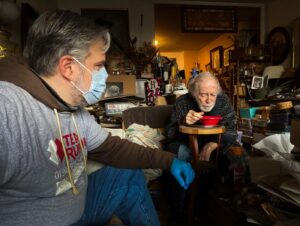On a mid-March day, New Yorker Carlos Chiossone’s phone began ringing off the hook. The calls came from people he didn’t know; from the families, and friends, and relatives of neighbors living in the nearby 11,000-apartment Stuyvesant Town complex in Manhattan. “Can you check on my mother, my aunt, my neighbor down the hall?” the callers asked. Word soon spread that the Greyshirt and a handful of other New Yorkers were in the area, and within hours the requests had swelled to over 100. The group of six went door-to-door to check them all.

Carlos Chiossone and his father-in-law.
On that first day alone, Chiossone and a nurse from the nearby VA hospital checked in on a full 30 elderly men and women and shut-ins, and delivered meals to many.
“The idea was just to go in every day, check-in, and bring these people things they needed,” says Chiossone.
The first day may have been the busiest for the group, but it wasn’t the last. Chiossone kept going back. Donning mask and gloves from his own small cache at home—one he’d acquired well before the coronavirus crisis—he’d walk the halls of Stuyvesant Town, stopping by apartments to offer company or an ear. As needed, he’d check vital signs, then report those numbers to doctors elsewhere across the city. “Gloves are a must, and sanitizing wipes are best if you need to come in contact with someone to check blood pressure—or for any other reason,” he admonishes.
Some days he’d help a neighbor take their blood pressure or check vital signs, other times he was just there to deliver black beans and rice, or to share a short chat. The youngest person he checked on regularly was 82; the oldest 92.
“I have found that many of the elderly don’t fully understand what is going on,” says Chiossone. “Several people with dementia or Alzheimer’s are not respecting social distancing. They forget about it, and they are highly at risk. And, they often need more than one visit a day. This has been some real-life training.”

Chiossone’s father-in-law, and favorite neighbor.
Even as the work dribbled—off as children and grandchildren arrived to care for their own, or whisk them off to homes outside the city—Chiossone continued. Soon, the number of people he was checking on dwindled to eight, then five. He still checks to make sure that no one needs anything—he recently helped an elderly woman “carry her ‘very heavy’ toilet paper” from the street to her apartment.
Today, as the coronavirus races across New York City, where more than 43,000 people are infected, Chiossone checks in on just a couple of people regularly, including his favorite: his own father-in-law. Every day they spend the lunch hour together, breaking bread and talking.
Late in the evening of March 29, Chiossonne’s phone rings again. It’s the home healthcare aide for the 92-year-old woman. Her charge has heard the city might be quarantined and is panicked. And, just like that, he is off again, gloves in hand, to explain the state of the world to his elderly neighbor, and also to help calm her down.



